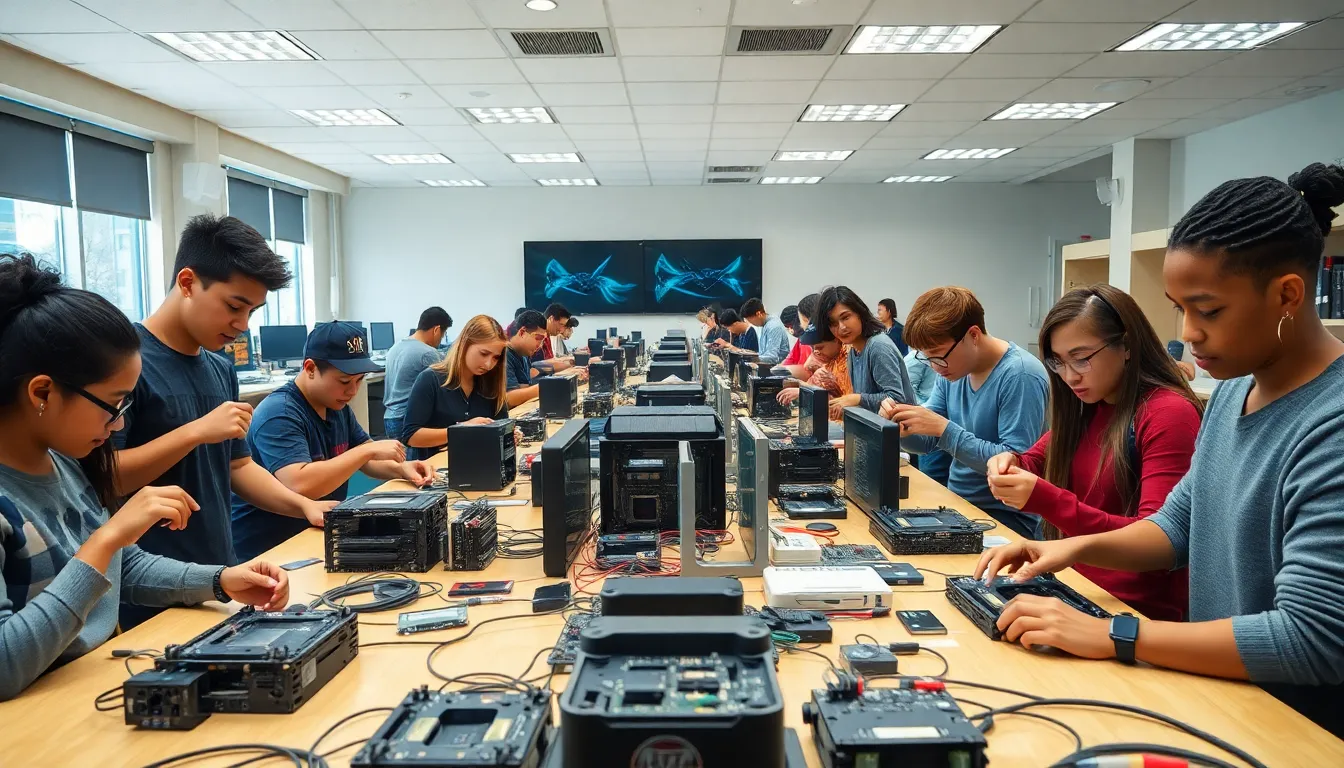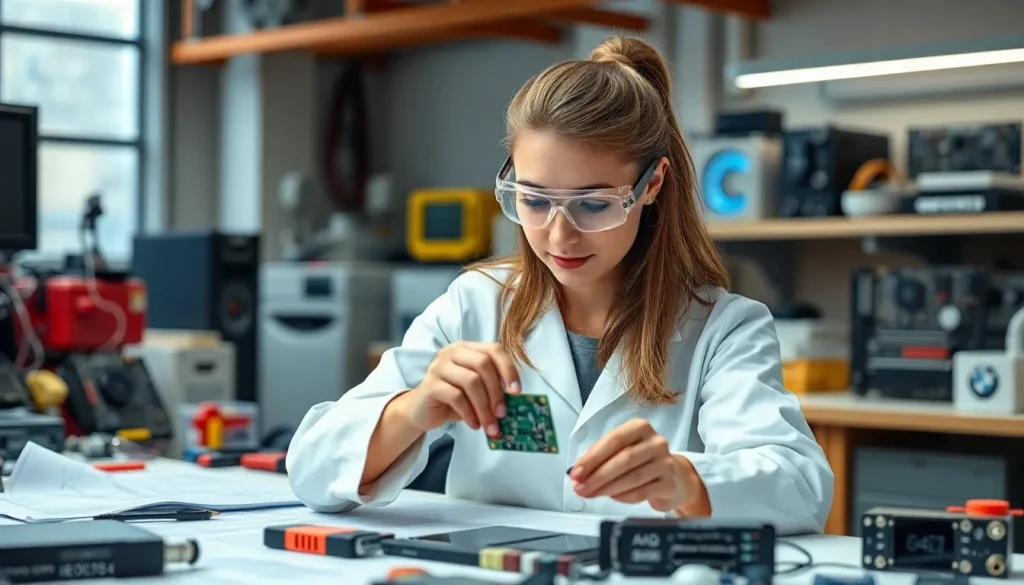Table of Contents
ToggleIn a world where computers rule everything from gaming to global finance, understanding the hardware behind the magic is more crucial than ever. Imagine being the go-to guru among friends when their laptops crash or when they can’t figure out why their gaming rig sounds like a jet engine. A computer hardware course can turn that dream into reality, equipping anyone with the skills to tackle tech troubles like a pro.
Not only does this course demystify the inner workings of computers, but it also transforms the dreaded “blue screen of death” into just another day at the office. With a blend of humor and hands-on learning, students dive into everything from building their own machines to troubleshooting common issues. So why not swap those endless scrolling sessions for a chance to become the hardware hero everyone needs?
Overview of Computer Hardware Course
This course covers essential computer hardware knowledge, equipping students with practical skills to address common tech issues. Engaging content captures attention while promoting confidence in handling hardware challenges.
Definition and Importance
A computer hardware course provides foundational knowledge of physical components within computers. Topics often include motherboards, CPUs, memory, and storage devices. Understanding these elements proves crucial in today’s tech environment. Students learn how hardware interacts with software, enhancing overall system performance. This knowledge builds the confidence necessary for troubleshooting and upgrading systems. Emphasizing hands-on experience, the course prepares individuals for real-world tech situations, promoting effective problem-solving strategies.
Target Audience
Individuals looking to enhance their technical skills find this course highly beneficial. Aspiring IT professionals gain a competitive edge in job markets by mastering hardware fundamentals. Hobbyists interested in building or upgrading their systems benefit significantly from hands-on instruction. High school students exploring technology careers also find value in the practical knowledge acquired. Senior citizens seeking to improve their computer literacy can better navigate modern devices. Ultimately, the course appeals to anyone curious about computers, making it an excellent choice for diverse audiences.
Course Content

This course offers a comprehensive overview of computer hardware, designed to build both knowledge and hands-on skills. Students explore fundamental concepts while engaging with practical applications.
Core Modules
Core modules cover essential topics such as motherboards, CPUs, memory, and storage devices. Each module dives into the specific roles and functions of these components. Understanding how hardware integrates with software forms a key aspect of the curriculum. Lessons also emphasize troubleshooting techniques tailored to common hardware issues, equipping students with valuable problem-solving strategies. Knowledge gained from these modules empowers individuals to take on hardware challenges with confidence.
Practical Applications
Hands-on components allow students to apply learned theories in real-world scenarios. Building computer systems serves as a primary focus, where students assemble components and realize how each part contributes to overall performance. Troubleshooting exercises simulate everyday problems, providing experience in diagnosing issues effectively. Students also engage in collaborative projects that teach teamwork and communication skills, vital for both personal and professional development. By the end of the course, participants leave equipped to tackle both technical tasks and workplace challenges.
Learning Experience
The learning experience in a computer hardware course is enriching and engaging. Students immerse themselves in both theoretical knowledge and practical applications from the beginning.
Teaching Methods
Instructors utilize a variety of teaching methods to enhance understanding. Lectures provide foundational knowledge, while hands-on activities reinforce concepts. Moreover, interactive workshops allow for real-time problem-solving. Group discussions stimulate critical thinking about hardware interactions. Students also benefit from live demonstrations that showcase troubleshooting techniques for common issues.
Resources and Materials
Course resources include comprehensive textbooks and online materials tailored for computer hardware. Students access detailed diagrams that illustrate component functions and relationships. Video tutorials provide visual guidance on assembly processes and troubleshooting steps. Additionally, access to hardware kits enables students to practice building systems. Supplemental readings encourage deeper exploration of advanced topics, fostering curiosity and enhancing technical knowledge.
Career Opportunities
A computer hardware course opens several career paths in the tech industry. Knowledge gained can lead to roles in IT support, systems administration, and hardware engineering, among others.
Job Prospects
Job prospects in the field remain strong as businesses increasingly rely on technology. IT support specialists help users troubleshoot issues and maintain systems, offering a stable career with numerous openings. System administrators manage and oversee an organization’s IT infrastructure, ensuring optimal operation. Hardware engineers design and test components, requiring a solid understanding of both hardware and software interactions. Positions typically exist across sectors like education, healthcare, and finance, presenting various opportunities for graduates.
Skills Development
Skills developed in a computer hardware course align with industry demand. Participants learn to assemble and repair computer systems, enhancing practical expertise through hands-on activities. Problem-solving abilities sharpen as students troubleshoot complex technical issues in real-time. Critical thinking grows during group discussions, where they analyze hardware interactions and their impact on system performance. Understanding of current technologies and tools becomes vital, preparing individuals for ever-evolving challenges in the tech landscape. Moreover, acquiring these skills fosters confidence, empowering graduates to tackle IT-related tasks effectively.
A computer hardware course offers invaluable skills and knowledge for anyone looking to thrive in today’s tech-centric environment. By transforming complex hardware concepts into accessible learning, participants gain the confidence to tackle a variety of tech challenges. This course not only prepares individuals for rewarding careers in IT but also nurtures a proactive mindset towards technology.
With a blend of theoretical insights and hands-on experience, students emerge ready to meet the demands of an ever-evolving industry. Whether for personal growth or professional advancement, enrolling in a computer hardware course is a smart investment in one’s future.










